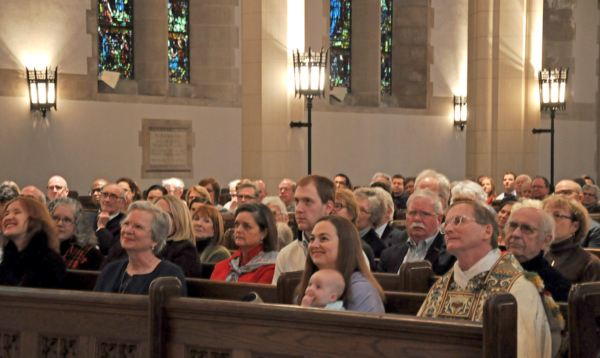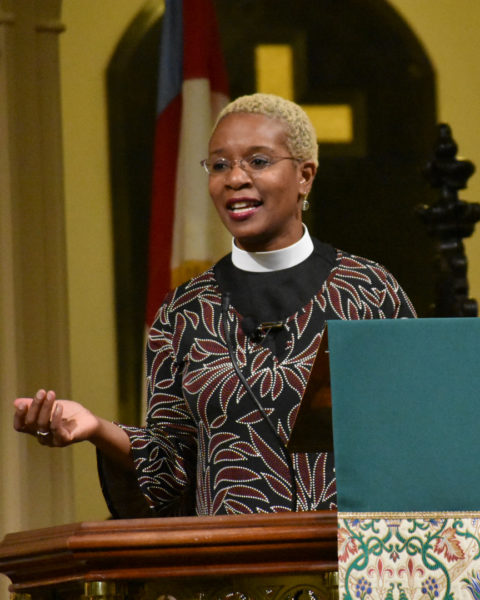Racial audit of church leadership seen as step toward ensuring Episcopal culture of welcomePosted Sep 9, 2019 |
|

The Episcopal Church’s membership is mostly white, but it is taking steps to diversify its leadership to better reflect the communities it serves. A racial diversity survey of church leadership is underway. Photo: Mary Frances Schjonberg/Episcopal News Service
[Episcopal News Service] The Episcopal Church is one of the whitest Christian denominations in America. White Episcopalians make up 90 percent of church membership, according to the Pew Research Center, compared to a U.S. population that is 62 percent white.
Those are sobering numbers for a church committed to dismantling racism and segregation, said the Rev. Stephanie Spellers, the presiding bishop’s canon for evangelism, reconciliation and creation care. “What that shows is, we as a church are grossly out of sync with the communities where God has placed us.”

The Rev. Stephanie Spellers is canon to the presiding bishop for evangelism, reconciliation and creation care. Photo: David Paulsen/Episcopal News Service
If the church is out of sync, it isn’t out of hope. Spellers’ staff distributed a survey to members of Executive Council and the House of Bishops last month, a first step toward painting a clearer picture of the racial makeup and culture of The Episcopal Church’s leadership. The pool of respondents will broaden in the coming months to include churchwide staff members, the House of Deputies, and a sampling of leaders from three dioceses in each of the church’s nine provinces.
Executive Council members’ version of the survey starts by collecting basic demographic info before shifting to subjective questions about church processes, discrimination and racism, as well as whether respondents have felt welcomed, supported and respected in their roles. A preface to the survey states the results will provide insight into “experienced or observed inequities that might be connected to racism.”
The Boston-based Mission Institute, which works in the Episcopal tradition to help churches and communities confront racism, will compile the survey data, along with interviews with selected respondents, for a final report that will be presented to General Convention in 2021. Spellers and other church leaders are counting on this audit to guide The Episcopal Church as it seeks to become more inclusive and bridge racial divides in an increasingly diverse America.
“We have a history as a segregated church,” Spellers said in interview with Episcopal News Service. “That story has not changed nearly as much as we wish.”
The audit is the latest component of the church’s ongoing work toward racial reconciliation, which General Convention in 2015 identified as one of the church’s top priorities. In 2017, the church launched the Becoming Beloved Community framework as a resource for deepening conversations about the church’s historic complicity with slavery, segregation and racism, and it aimed to enlist all Episcopalians in the work of racial healing.

The labyrinth diagram showing the four parts of the Episcopal Church’s Becoming Beloved Community is colored for an Advent mailing.
The framework is broken into four parts that are illustrated as a labyrinth: telling the truth about our churches and race, proclaiming the dream of Beloved Community, practicing the way of love in the pattern of Jesus and repairing the breach in society. A report introducing the framework identified a need for “a census of The Episcopal Church” under “Telling the Truth.”
“If we seek reconciliation, healing, and new life, it begins with telling the truth about The Episcopal Church’s racial composition, especially given the Church’s relationship to the complex history of race in the 17 nations our Church calls home,” the Becoming Beloved Community framework says.
A comprehensive census of the church, however, was too expensive to be feasible, Spellers said. Pursuing a more modest audit based on existing data also proved problematic because neither the Church Pension Group nor congregational parochial reports collect racial data. One of the few recent attempts at quantifying diversity involved manually checking diocesan websites for staff photos and counting the number of people of color.
Despite those limitations, Spellers expects the Mission Institute’s audit will produce a foundation of insight, identify recurring themes and assist with making recommendations for change.
“We have anecdotes, but you cannot engage deep transformation work based on anecdotes,” she said. “Even as we tell our stories, even as we learn to listen to the other, we need to bring more data into the conversation so that we can dream and strategize more concretely about a future as Beloved Community.”
For the churchwide audit, the Mission Institute will draw on its experience helping the Diocese of Massachusetts develop a more inclusive clergy formation process, and its subsequent interviews with bishops and clergy of color last year at General Convention.
Its Diocese of Massachusetts work stemmed from a particular case, in which an African American woman who was on the path to ordination into the priesthood withdrew from the process, saying she did not feel welcomed. The diocese’s Commission on Ministry asked the Mission Institute to study the process and make recommendations.
Diocesan leaders “were generally unaware how much things like racial bias and also issues of class and continuing issues around gender impact and really shift people’s experience in the ordination process,” the Rev. Edwin Johnson told ENS. He is rector at St. Mary’s Episcopal Church, a largely Afro-Caribbean congregation in Dorchester, and serves as chair of the Presiding Officers’ Advisory Group on Beloved Community Implementation.
The Mission Institute interviewed Episcopalians going through the discernment process in the Diocese of Massachusetts and produced a report the that identified six themes that suggested ways the diocese could become more welcoming, such as encouraging people of color to be themselves and understanding how a dominant white culture can blind leaders to the importance of race.
“White people … tend to be unaware that they too are racialized. There is little attention given to helping white people move past this dis-consciousness, and to seeing that the ordination process forms people in and for anti-racist, multicultural ministry,” the Ministry Institute said in one of its highlights.
That work in Massachusetts caught the attention of members of the presiding bishop’s racial reconciliation team, and they invited the Mission Institute to ask similar questions in a churchwide context when General Convention convened in July 2018 in Austin, Texas. There, the Mission Institute spoke with 18 ordained people of color, whose stories, experiences and perspectives were compiled anonymously in a report submitted to the racial reconciliation team last fall.
The report puts the words of its interview subjects front and center and encourages church leaders to learn from the observations and then act in ways that go further than adding more diverse members to committees or updating websites to show more people of color.
“These changes can be important, but they tend to operate at a surface level. They rarely catalyze a deep, institutional shift because they do not engage the larger norms and practices of the institution,” the report said. “It is our searching and honest reflection on core values and norms, and how they are embodied in formal routines and procedures, that strengthens our quest for enduring change.”
The racial audit of church leadership, then, is the church’s next step toward that enduring change, and for change to take hold, the Rev. Katie Ernst, interim executive director of the Mission Institute, suggested the church will need to approach the audit as a starting point.
“The big question for me is, What’s next? So what?” she said. How the church responds will determine whether it makes progress in dismantling racism.
“I’m excited about keeping that question in our pocket as we’re doing this work,” Ernst said, because the “insidious effects of white supremacy” continue to deny many people a full place in the Beloved Community.
“That is not of God, and that is happening all the time for folks of color,” she said. “And unfortunately, it continues to happen in the church.”
– David Paulsen is an editor and reporter for Episcopal News Service. He can be reached at dpaulsen@episcopalchurch.org.

Social Menu